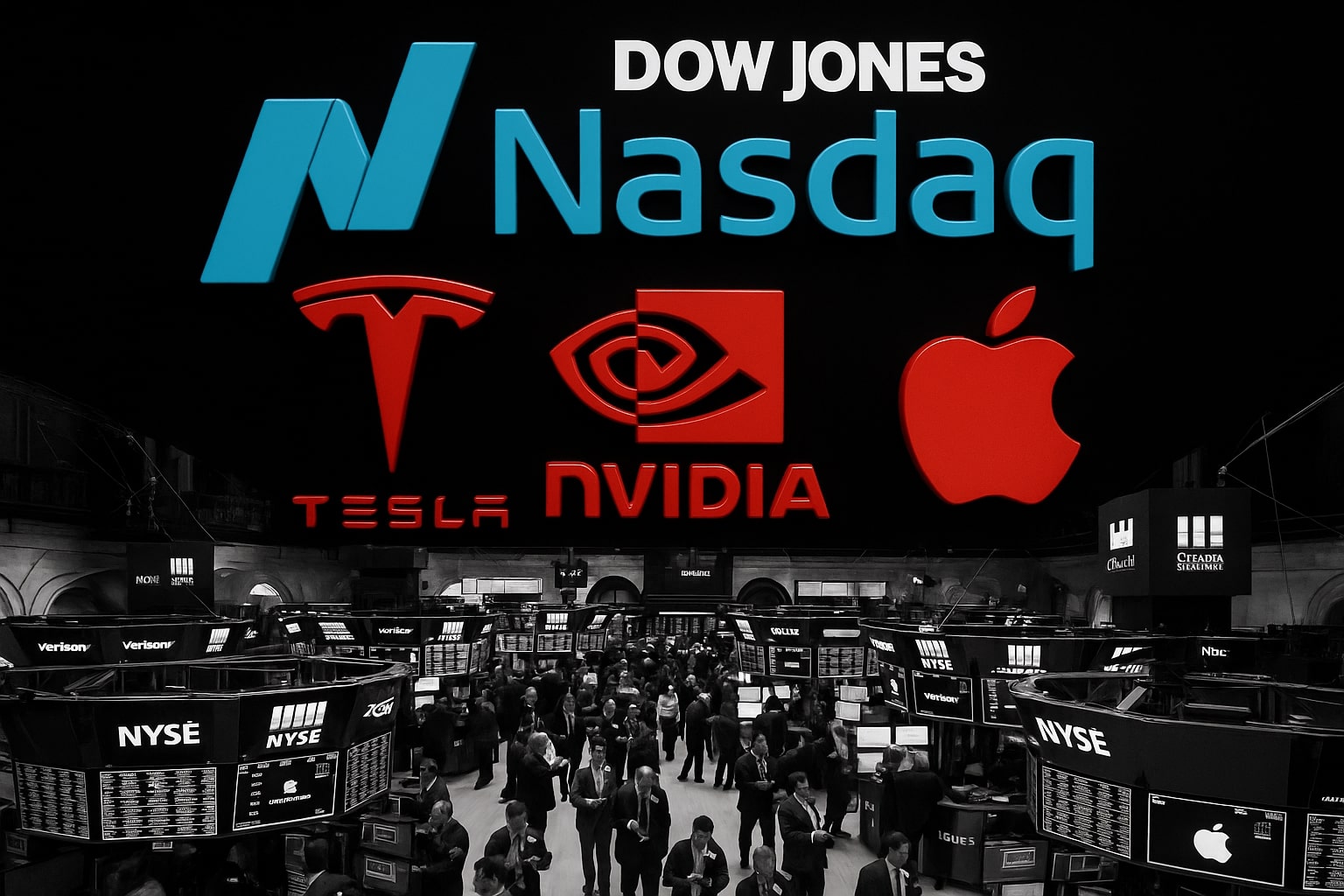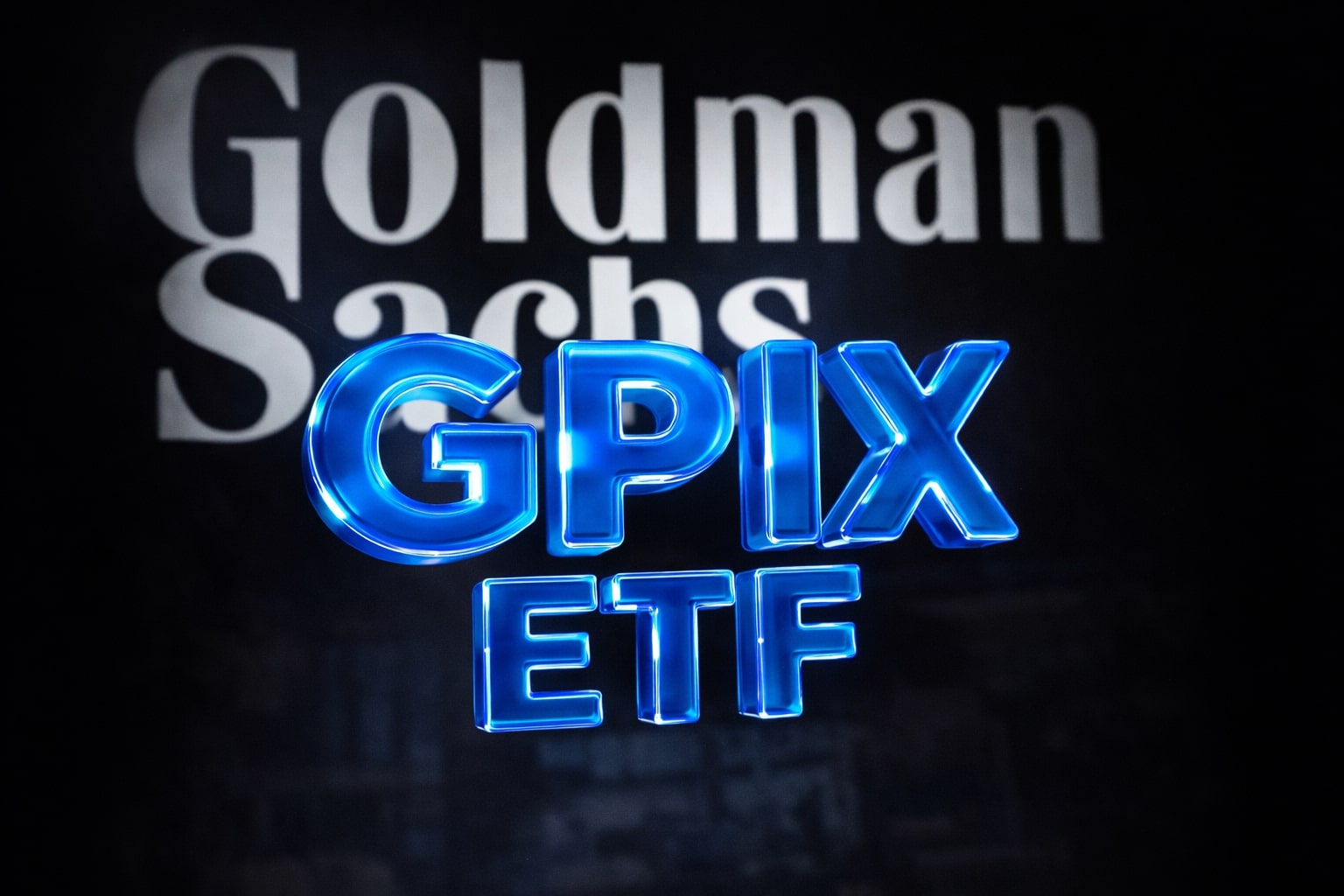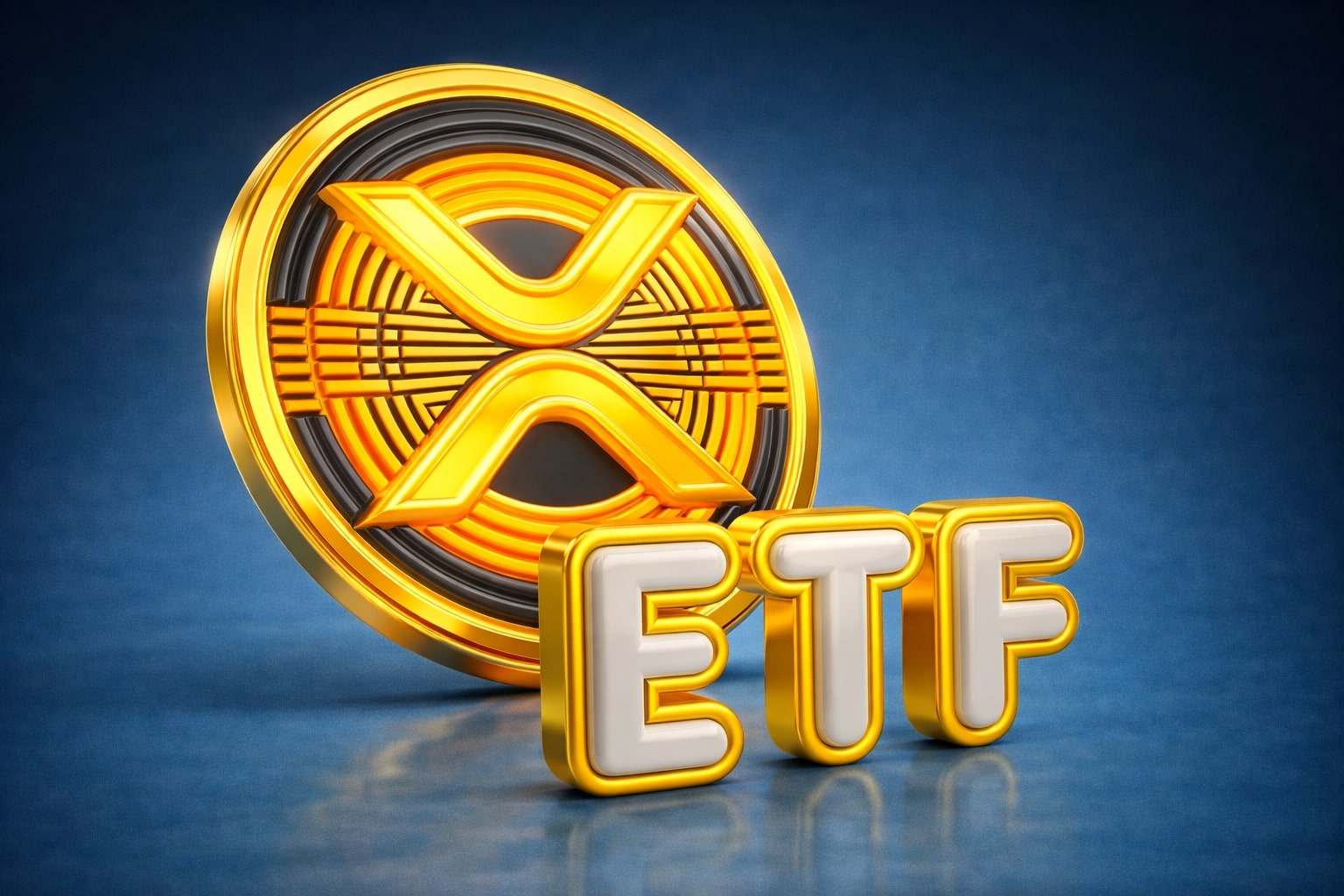
Stock Market Today: Nasdaq 22,384 | TSLA, NVDA, AMD, AAPL Sink as AI Rout Hits Wall Street
S&P 500 6,710 (-0.9%) and Dow 36,710 (-0.8%) slide as AI valuations crack, job cuts surge 153,074 — worst since 2003 — while TSLA pay vote and Brent $62.96 add pressure | That's TradingNEWS
Wall Street Faces Its Toughest Week as AI Euphoria Cracks
U.S. equities stumbled into the second week of November under heavy pressure from profit-taking, labor uncertainty, and a fading AI rally that dominated most of 2025. The Nasdaq Composite (^IXIC) tumbled 1.6% to 22,384.70, the S&P 500 (^GSPC) slipped 0.9% to 6,710.76, and the Dow Jones Industrial Average (^DJI) lost 0.8% to 36,710, erasing nearly $800 billion in combined market value across the three major indices.
Semiconductor and Big Tech shares bore the brunt of the correction. Advanced Micro Devices (NASDAQ: AMD) dropped 6%, Qualcomm (NASDAQ: QCOM) fell 4%, and Nvidia (NASDAQ: NVDA) shed 2%, signaling the market’s growing discomfort with stretched valuations across the AI complex. The CBOE Volatility Index (VIX) spiked above 19, marking its highest level since early October and underscoring the rising fear premium across Wall Street.
Mass Layoffs Reach the Worst October Level Since 2003
Investor sentiment deteriorated sharply after the Challenger, Gray & Christmas report showed 153,074 layoffs in October, nearly triple the 55,597 announced a year earlier. It marked the worst October since 2003 and brought total job cuts this year to 1.09 million, up 44% from 2024. Technology, finance, and retail sectors led the downsizing as companies sought to realign headcount after two years of overexpansion.
Andy Challenger, the firm’s chief revenue officer, emphasized that “October’s pace of job cutting was much higher than average,” reflecting corporate caution amid automation and slowing demand. Meanwhile, the ADP private payroll report showed just 42,000 new jobs, ending the short-lived summer rebound. The weak data reinforced fears that U.S. growth momentum is fading heading into the fourth quarter, placing further pressure on equity valuations and consumer sentiment.
AI Trade Faces Its Most Critical Turning Point
The artificial intelligence boom that propelled equity markets through most of 2025 finally encountered resistance. Duolingo (NASDAQ: DUOL) cratered 26% after its AI-driven forecast fell short of expectations, triggering a broad selloff in speculative tech.
The “Magnificent Seven” stocks—Tesla (NASDAQ: TSLA), Nvidia (NVDA), Apple (AAPL), Amazon (AMZN), Meta Platforms (META), Microsoft (MSFT), and Alphabet (GOOGL)—lost an estimated $1.2 trillion in combined value in just one week. Investors braced for volatility as Tesla shareholders prepared to vote on Elon Musk’s $1 trillion compensation package, a proposal seen as pivotal for corporate leadership stability.
In contrast, Apple (NASDAQ: AAPL) offered a rare bright spot. Its new iPhone 17 model recorded 14% higher sales across the U.S. and China compared to its predecessor. Analyst Ananda Baruah at Loop Capital upgraded the stock to Buy and raised the price target to $315 from $226, citing robust hardware demand. Still, broader market fatigue left most AI-exposed names under pressure.
Government Shutdown Extends to 37 Days, FAA Reduces Flights
The ongoing federal government shutdown, now in its 37th day, cast another shadow over Wall Street. The paralysis has disrupted economic data releases, delayed agency payments, and undermined consumer confidence.
The Federal Aviation Administration (FAA) announced a 10% reduction in flights at 40 airports as unpaid air traffic controllers struggled to maintain safety operations. The decision immediately hit airline stocks. Delta Air Lines (NYSE: DAL) and Southwest Airlines (NYSE: LUV), both up over 5% earlier in the week, reversed course and fell back amid mounting travel chaos.
Analysts warned that if the shutdown continues through mid-November, the drag on GDP could exceed 0.4 percentage points in Q4. Treasury Secretary Scott Bessent remained publicly optimistic but acknowledged that “delays in fiscal coordination are starting to show up in the data,” hinting that an extended impasse could weigh heavily on fourth-quarter growth.
Supreme Court Tariff Hearings Spark Global Market Reaction
The U.S. Supreme Court’s deliberations on the legality of President Trump’s trade tariffs rippled across global markets. Several justices expressed doubt over the breadth of executive power in tariff enforcement, fueling speculation that key policies could be reversed.
Saudi Aramco (TADAWUL: 2223.SR) reacted swiftly, slashing crude prices for Asian customers to the lowest level in 11 months, citing weakening global demand. Brent crude fell 0.4% to $62.96 per barrel, while WTI crude traded near $59.80. Analysts noted that Aramco’s move might signal a pivot toward defending market share as OPEC+ prepares to unwind production cuts into 2026.
Energy stocks followed oil prices lower. ExxonMobil (NYSE: XOM) dipped 0.5%, while Chevron (NYSE: CVX) finished flat. Traders now anticipate crude supply to exceed demand by over 1.1 million barrels per day early next year if consumption remains weak.
Crypto Miners Suffer as Bitcoin Dips Below $110,000
The downturn spread to the digital assets space, with Bitcoin (BTC-USD) sliding 3.4% to $109,534.50, its lowest in three weeks. Cipher Mining (NASDAQ: CIFR) plunged 17.7% to $11.64 despite signing a 10-year AI hosting deal valued at $3 billion with Fluidstack, backed by Alphabet (NASDAQ: GOOGL) guaranteeing $1.4 billion of obligations.
The partnership highlighted crypto miners’ ongoing transition toward high-performance AI computing infrastructure. However, investors remained unconvinced, with Riot Platforms (NASDAQ: RIOT) losing 7% and Hut 8 Corp (NASDAQ: HUT) dropping 7.9%. The broader sentiment indicated that correlation between crypto assets and high-beta tech remains tight, leaving miners vulnerable to Bitcoin volatility even as they diversify revenue streams.
Global Equities Decline but Japan and Emerging Markets Offer Value
Global markets mirrored U.S. weakness. The Nikkei 225 fell 0.9%, the Hang Seng Index dropped 1.3%, and the FTSE 100 in London lost 0.7%.
Despite near-term weakness, institutional investors are turning to undervalued global equities. John Thorndike, co-head of GMO’s Dynamic Allocation ETF (NYSEARCA: GMOD), said his portfolio remains 60% in stocks and 40% in bonds, with overweights in Japan and emerging markets ex-China. He emphasized that “valuation spreads between growth and value stocks are at multi-decade highs,” adding that the firm expects negative seven-year real returns for U.S. large-caps versus positive returns abroad.
Thorndike cited Japan’s improving governance, shareholder reforms, and currency tailwinds as catalysts for outperformance. Meanwhile, the strong U.S. dollar continues to make non-U.S. assets more attractive to global investors seeking long-term alpha.
Philippine Market Slides on Weak GDP and Typhoon Threats
The Philippine Stock Exchange Index (PSEi) extended losses for a third straight week, dropping 170.31 points to 5,759.37, its lowest level since October 2022. GDP growth slowed to 4% in Q3 — the weakest since 2021 — as infrastructure irregularities and weather disruptions dampened investment activity.
Average daily trading rose to ₱6.47 billion, with foreign investors representing 54% of transactions and net buying ₱4.54 billion. The Services Index was the only sector to post gains, up 33.82 points to 2,297.32, buoyed by banking and trade resilience.
Broker 2TradeAsia said “the local market is trapped between fiscal drag and external volatility,” advising selective positioning in financials and consumer staples. Support is at 5,600, with resistance between 5,900 and 6,000.
Read More
-
GPIX ETF Climbs to $52.54 as 8% Yield Turns S&P 500 Volatility Into Income
02.01.2026 · TradingNEWS ArchiveStocks
-
XRP ETF Rally: XRPI $11.54, XRPR $16.35 And XRP-USD At $1.99 Aim For A $5–$8 Cycle
02.01.2026 · TradingNEWS ArchiveCrypto
-
Natural Gas Price Forecast: NG=F Tests $3.50–$3.60 Floor Before LNG Wave
02.01.2026 · TradingNEWS ArchiveCommodities
-
USD/JPY Price Forecast - USDJPY=X Holds Near 157 as BoJ Caution and Fed Cut Bets Drive the Move
02.01.2026 · TradingNEWS ArchiveForex
Earnings Spotlight: Warner Bros, Airbnb, and Moderna on Watch
Market attention pivoted to upcoming results from Warner Bros. Discovery (NASDAQ: WBD), Airbnb (NASDAQ: ABNB), and Moderna (NASDAQ: MRNA). WBD and ABNB traded modestly higher as investors anticipated stable guidance, while Moderna faced selling pressure amid weakening vaccine revenue.
Traders warned that disappointing results from these bellwether firms could amplify volatility across consumer and healthcare sectors. With more than 70% of S&P 500 companies having reported, aggregate earnings growth for Q3 stood near 4.8%, but forward guidance remains the critical driver for risk sentiment.
Weekly Outlook: Defensive Rotation and Rate Anchoring Ahead
The coming week will likely feature choppy trade as investors balance inflation expectations and the Federal Reserve’s next move. The 10-year Treasury yield hovered at 4.6%, maintaining pressure on equity multiples while offering income stability to bond investors.
Fund managers continued rotating into utilities, healthcare, and financials as defensive positioning became the dominant theme. GMO’s Thorndike reiterated that non-U.S. equities “offer higher expected returns” as the dollar remains overvalued. Analysts anticipate volatility in AI and semiconductors to persist until job data and earnings stabilize.
TradingNews.com Verdict: Short-Term Bearish, Long-Term Selective Buy
TradingNews.com maintains a short-term bearish outlook as the market digests a trifecta of weak job data, AI valuation fatigue, and policy gridlock. The Nasdaq is expected to trade between 21,950 and 22,600, the S&P 500 between 6,650 and 6,780, and the Dow Jones within 36,400–37,000.
Long-term positioning remains selectively bullish, favoring Japan, India, and emerging-market value equities, along with energy infrastructure ETFs offering defensive yield exposure. As AI-related excess unwinds, disciplined investors could find renewed opportunity in quality value and dividend sectors while preparing for a volatile close to 2025.


















